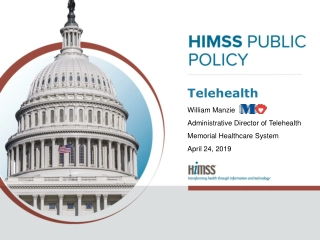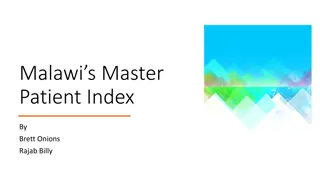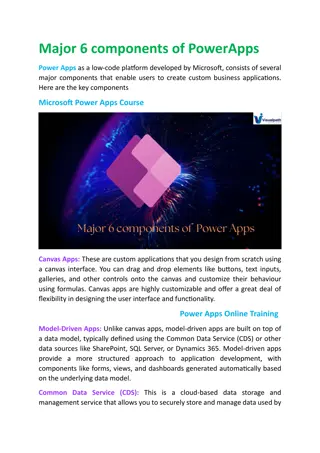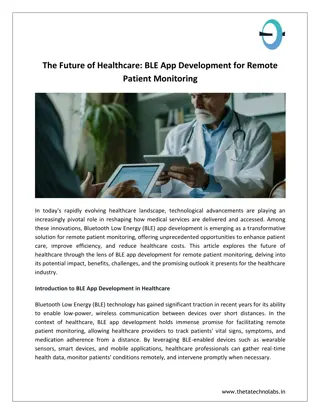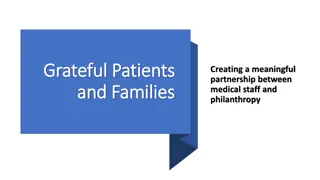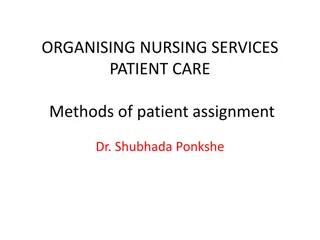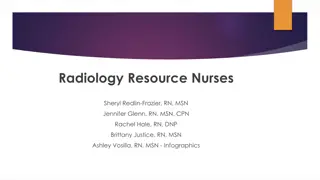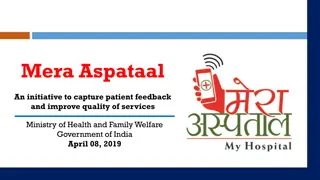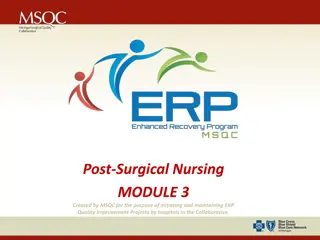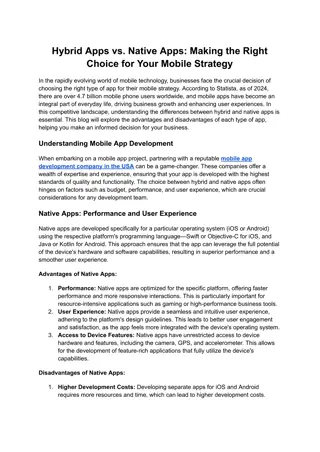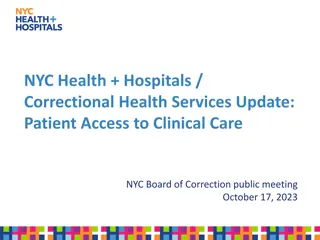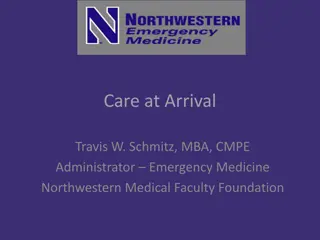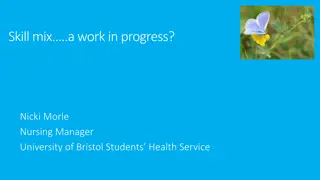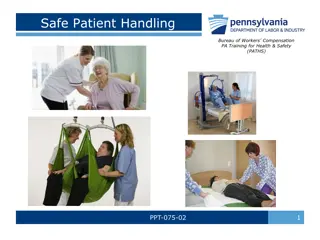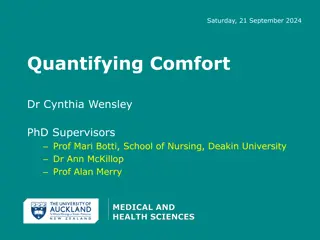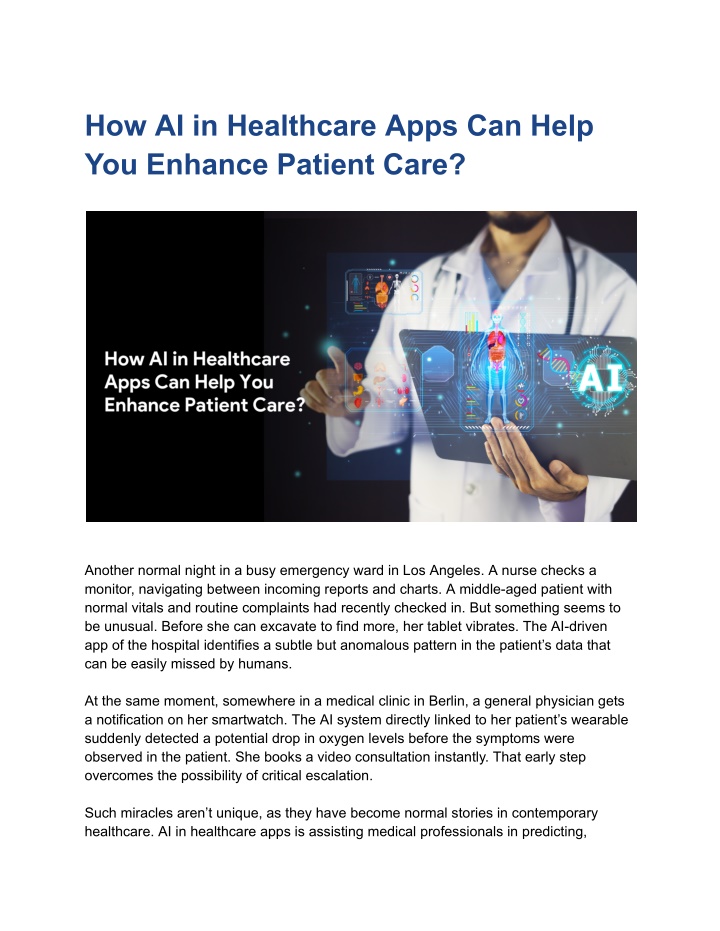
How AI in Healthcare Apps Can Help You Enhance Patient Care?
Explore how AI-powered healthcare apps are revolutionizing patient care. This comprehensive guide delves into the ways artificial intelligence improves diagnosis accuracy, enables personalized treatment plans, streamlines administrative workflows, an
Download Presentation

Please find below an Image/Link to download the presentation.
The content on the website is provided AS IS for your information and personal use only. It may not be sold, licensed, or shared on other websites without obtaining consent from the author. If you encounter any issues during the download, it is possible that the publisher has removed the file from their server.
You are allowed to download the files provided on this website for personal or commercial use, subject to the condition that they are used lawfully. All files are the property of their respective owners.
The content on the website is provided AS IS for your information and personal use only. It may not be sold, licensed, or shared on other websites without obtaining consent from the author.
E N D
Presentation Transcript
How AI in Healthcare Apps Can Help You Enhance Patient Care? Another normal night in a busy emergency ward in Los Angeles. A nurse checks a monitor, navigating between incoming reports and charts. A middle-aged patient with normal vitals and routine complaints had recently checked in. But something seems to be unusual. Before she can excavate to find more, her tablet vibrates. The AI-driven app of the hospital identifies a subtle but anomalous pattern in the patient s data that can be easily missed by humans. At the same moment, somewhere in a medical clinic in Berlin, a general physician gets a notification on her smartwatch. The AI system directly linked to her patient s wearable suddenly detected a potential drop in oxygen levels before the symptoms were observed in the patient. She books a video consultation instantly. That early step overcomes the possibility of critical escalation. Such miracles aren t unique, as they have become normal stories in contemporary healthcare. AI in healthcare apps is assisting medical professionals in predicting,
detecting, and responding faster than ever before. In a field where every second matters, these intelligent systems cannot replace doctors. Instead, they re empowering them. It doesn t matter whether you are running a hospital chain, handling a small medical clinic, or looking forward to building a health startup, as it cannot change the fact that AI is not in the future of the healthcare industry but exists in the present. To gain a competitive edge and set new standards for patient care, safety, and satisfaction, it is important to embrace AI. In this blog, we ll hunt to discover how AI in healthcare apps is not just enhancing patient care it s redefining it. The Rise of AI in Healthcare AI in healthcare is undoubtedly transforming patient care by facilitating faster, wiser, and highly personalized medical attention. Its unification is largely enabled by the ability to analyze huge amounts of data faster and more precisely. From machine learning to natural language processing and predictive analytics, artificial intelligence tools are now dealing with some of the critical challenges in the healthcare industry. 1. Predictive Analytics for Proactive Care One of the most crucial use cases of AI in healthcare is predictive analytics. By analyzing records or data of patients, AI can be used to foresee possible health weaknesses before they become serious health issues. As an example, predictive models may help estimate the risk of hospital readmissions, with which healthcare professionals could undertake the desired prevention and achieve optimal patient outcomes. 2. Enhancing Diagnostic Accuracy Artificial Intelligence-supported diagnosis tools are changing the speed and accuracy of both diagnosis and treatment. Machine learning algorithms can help analyze images (such as X-rays, MRIs, and CT scans) to point out abnormalities that might be skipped by humans. In a few cases, AI has shown its brilliance as it outperformed human
radiologists in identifying early signs of diseases like cancer, thanks to the advanced solutions developed by the top AI development companies. 3. NLP for Improved Patient Interaction Natural language processing is another game-changing technology in the healthcare space. It allows systems to communicate with human language, enhancing communication between the patients and the healthcare providers. Using chatbots driven by AI, patients will be able to get prompt responses, reserve slots, and even get mental health assistance without any line or call. 4. Personalizing Patient Care At the heart of innovation is personalization. With the use of artificial intelligence, healthcare apps hold the potential to design individualized treatment plans with consideration of a patient's or his/her health history, genetic makeup, lifestyle, or preference. This personalization boosts patient satisfaction and treatment success rates. 5. Precision Medicine AI in healthcare also plays a key role in advancing precision medicine, which involves customizing treatment based on individual genetic profiles. AI can analyze complex genetic data to recommend treatments that minimize side effects and maximize effectiveness an area where top software development companies are delivering groundbreaking solutions. 6. Personalized Health Monitoring With the use of AI, wearables and mobile health apps allow real-time tracking of vital signs, including heart rate, blood pressure, and blood glucose levels. Smart algorithms included in the systems not only give users personal health information, but they also give notifications to help patients have a superior command of their health.
7. Enhancing Access to Healthcare Availability of quality care is a huge universal challenge. The gap is narrowing, especially in rural or underserved communities, through AI-powered healthcare apps. AI-enabled telemedicine services connect patients to medical doctors without the need for a trip to save them the distance and cost. 8. Telemedicine and Remote Consultations Telemedicine platforms are employing AI to enhance virtual care. Smart chatbots perform initial triage to analyze the symptoms and refer a patient to a corresponding provider. During consultations, AI tools can help improve the efficacy of virtual health provision by investigating real-time information to recommend evidence-based treatment plans. 9. Bridging Language Barriers Language barriers may impede successful treatment. Translation tools using AI are now enabled to provide real-time interpretation during patient consultations, with the result that important medical information is conveyed to all parties, regardless of spoken language. Challenges and Ethical Considerations Though AI-based healthcare apps have tremendous potential, they also pose challenges and ethical issues that need to be resolved for them to be successfully adopted into healthcare systems. 1. Data Privacy and Security Healthcare use of AI involves access to massive amounts of sensitive patient information. Protecting the privacy and security of this information is critical. Healthcare professionals and developers need to comply with strict data protection laws and have effective security safeguards in place to avoid breaches.
2. Bias and Fairness AI algorithms can reinforce existing biases in the training data. This can result in unequal healthcare outcomes among different demographic groups. Developing and training AI models using representative and diverse datasets is important to reduce bias and uphold fairness in healthcare delivery. 3. Regulatory Compliance Healthcare apps powered by AI need to adhere to regulatory norms dictated by health authorities. This means acquiring requisite approvals for diagnostic applications and ensuring that AI systems are explainable and transparent. Being compliant with regulations will guarantee that AI-powered applications in healthcare are safe, effective, and dependable. The Future of AI-Driven Healthcare Apps The future of AI in healthcare is very promising, with ongoing improvements unfolding the possibility of more intelligent, personalized, and accessible patient care. Healthcare apps powered by AI are bound to transform the way medical professionals and patients communicate, owing to the latest innovations and advances in technology. Some of the major trends characterizing the future of patient-led innovation include: 1. Integration with Electronic Health Records (EHRs) AI-based applications will more and more connect with electronic health records (EHRs) to deliver an end-to-end picture of a patient's health. This connection will enable smooth sharing of information among providers, enhance care coordination, and allow for better decision-making through more informed insights. 2. AI-Enhanced Mental Health Support
Mental health is one of the most important aspects of the overall well-being, and AI-based solutions will bring influential assistance. These apps can provide mental healthcare in real time by using 24/7 virtual therapists and cognitive chatbots. In the near future, generative AI development services will further advance this space by enabling more human-like conversations and emotionally responsive support systems. 3. Advanced Genomic Analysis As the worlds of AI and genomics converge, medical identification of genetic risks enables the design of hyper-personalized treatment plans, ushering in a new era of precision medicine powered by AI in healthcare. Conclusion It is beyond any doubt that technology never stops evolving, and in this instance, AI technology is reshaping health care because it can be diagnosed several times faster and treated with a tailored and more targeted approach, and it is available to everyone. With tools (such as predictive analytics and real-time health monitoring), AI in healthcare apps is transforming how patients and providers connect. However, to achieve its full success, we have to address the ethical concerns to secure the privacy of data and remain in agreement with the rules. By teaming up with a trustworthy healthcare app development company, businesses can make a real impact and stand out in the market. Prepare yourself and embrace AI-enabled healthcare applications to curb the emerging challenges. Original Source: https://techblaster.co.uk/how-ai-in-healthcare-apps-can-help-you-enhance- patient-care/


